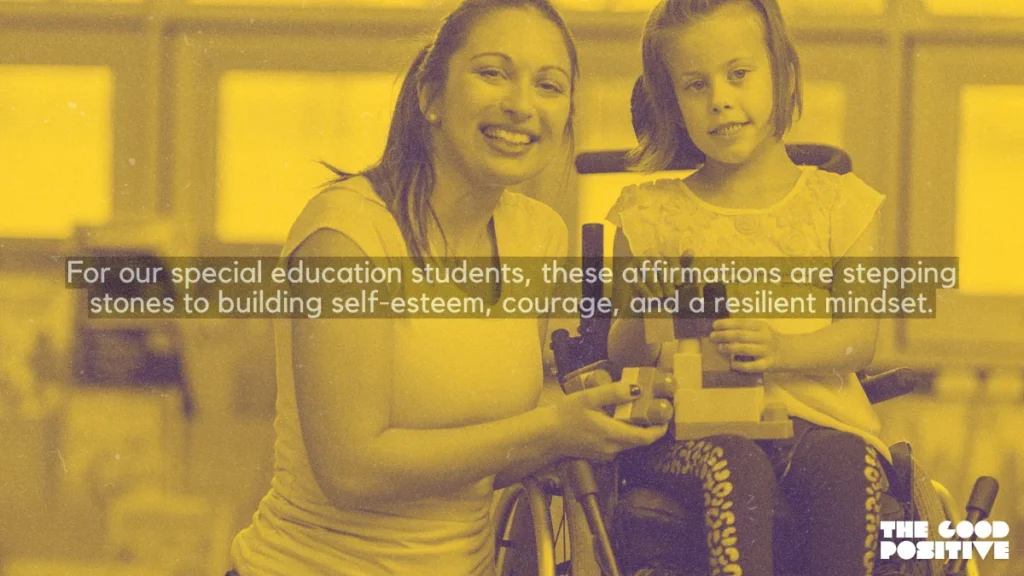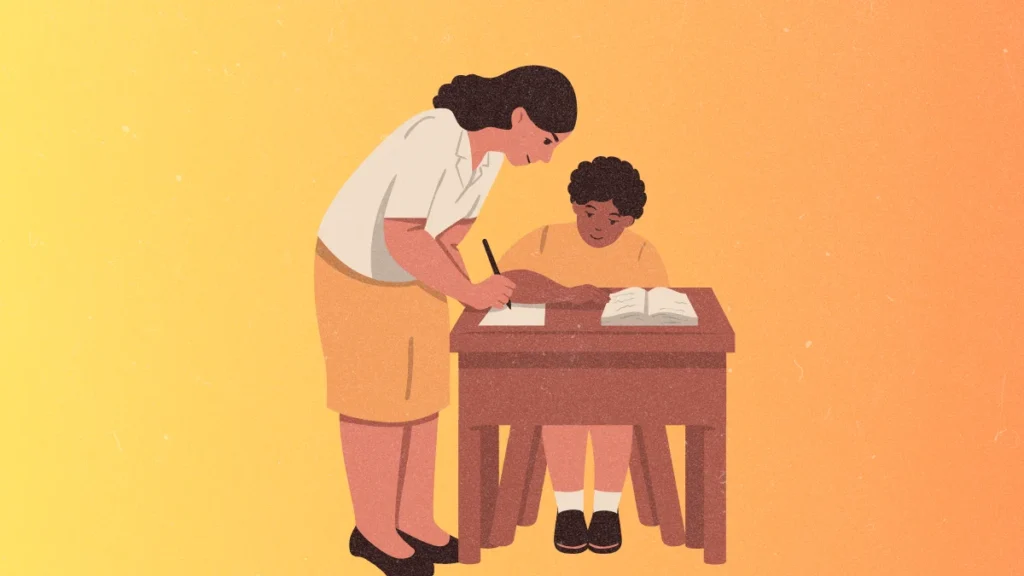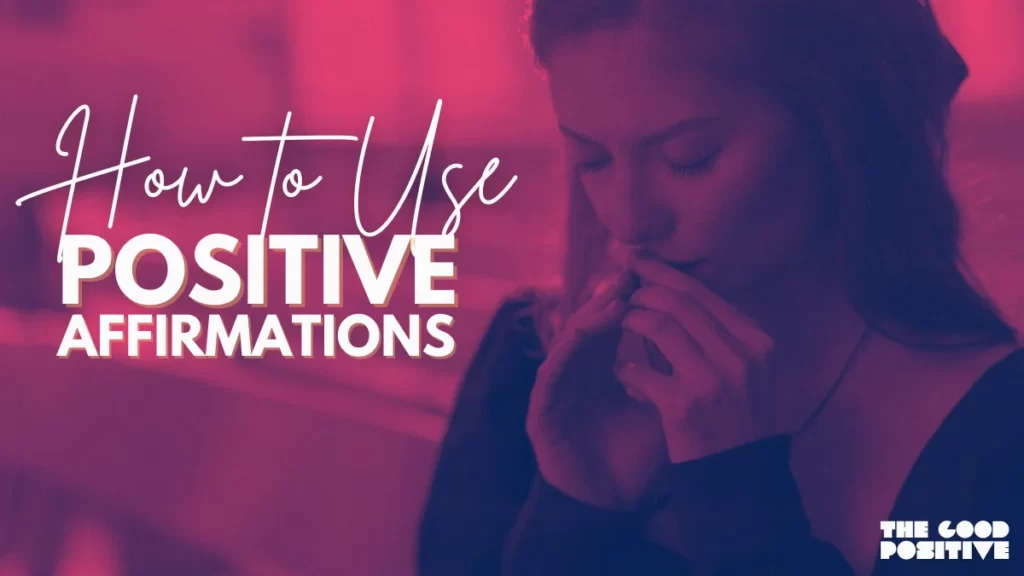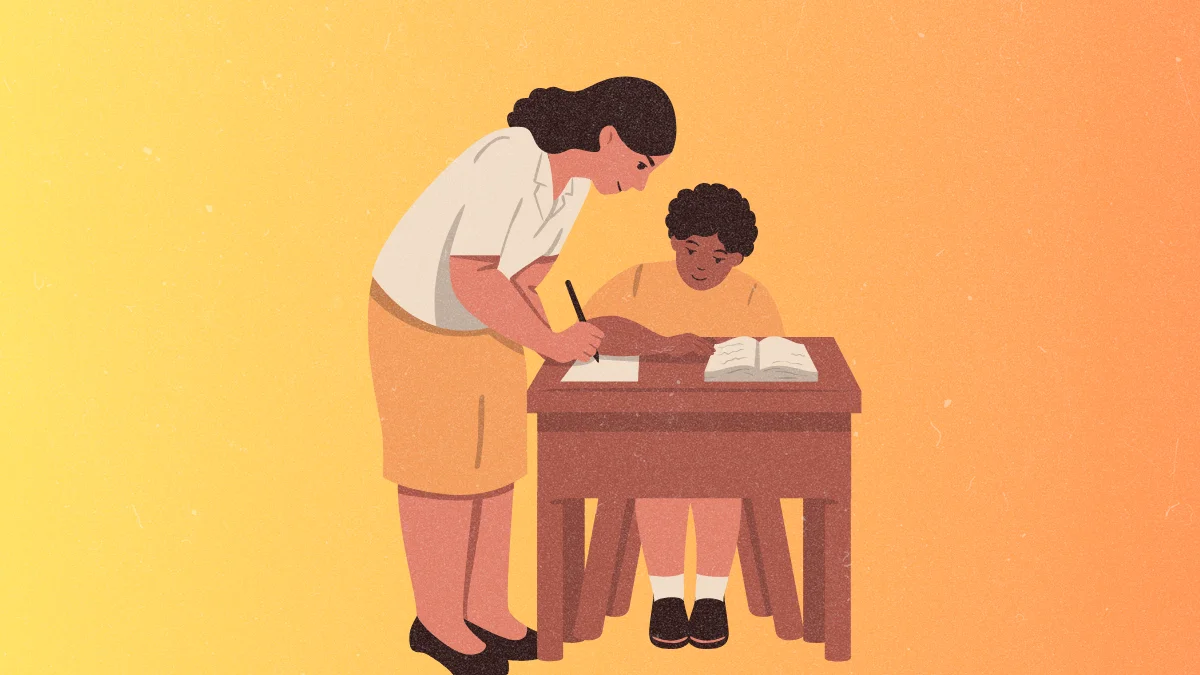Positive Affirmations for Special Education Students: Imagine walking into a room where every word spoken is a gentle nudge towards confidence, a soft whisper saying, “You’ve got this.”
For our special education students, these affirmations are more than just words; they’re stepping stones to building self-esteem, courage, and a resilient mindset.
Each affirmation is a brushstroke in the masterpiece of their unique journey, painting a future filled with possibilities and achievements.
So, let’s dive in and discover how these powerful phrases can transform everyday challenges into opportunities for growth and self-discovery.
Table of Contents
Affirm More: Positive Affirmations for Special Education Teachers.
Why Use Positive Affirmations for Special Education Students?

In the journey of learning and growth, special education students, like explorers in an unfamiliar land, face their own unique challenges. Positive affirmations act as a guiding light, illuminating their path with confidence and resilience.
Here’s why embedding these powerful phrases into their daily routine can make a significant difference:
Builds Self-Esteem: Take Jamie, who struggled with dyslexia. Each affirmation was a step towards seeing himself not as defined by his challenges, but capable and smart. Over time, “I am capable of learning in my own way” transformed his perspective and performance.
Encourages Resilience: Consider Alex, who found social interactions daunting. Affirmations like “I am valued and my voice matters” helped her navigate social nuances more confidently, turning daunting playgrounds into arenas of friendship and growth.
Fosters a Positive Mindset: Emma, facing the ups and downs of ADHD, clung to “I can focus on the task at hand” as a mantra. It didn’t erase her struggles but equipped her with a more optimistic outlook, making obstacles seem less insurmountable.
By intertwining positive affirmations with the educational tapestry of these students, we weave a stronger, more resilient fabric of self-belief and determination, proving that words, indeed, hold the power to transform lives.
100 Positive Affirmations For Special Education Students

Dive into our collection of “100 Special Education Students Affirmations,” a heartfelt compilation crafted to uplift, inspire, and empower the incredible learners navigating the special education journey.
Each affirmation is a beacon of light, designed to illuminate strengths, celebrate uniqueness, and foster unwavering belief in one’s abilities.
Why not make these affirmations a daily ritual? 🔖 Bookmark this page and commit to reciting these empowering words daily for 21 days.
Watch as this simple practice transforms self-doubt into confidence and challenges into stepping stones for growth. Let’s embark on this transformative journey together.
1. “I embrace my uniqueness and learn at my own pace.”
2. “My differences make me special and strong.”
3. “I am capable of overcoming any challenge with practice and perseverance.”
4. “Every day, I grow smarter and more confident.”
5. “I am a valued member of my school community.”
6. “My voice is powerful and my thoughts matter.”
7. “I have special talents that I share with the world.”
8. “Learning is my journey, and I navigate it with courage.”
9. “I am more than my disabilities; I am full of potential.”
10. “I receive the help I need and accept it with gratitude.”
11. “My classroom is a safe space where I thrive.”
12. “I am deserving of respect, love, and kindness.”
13. “Each day, I make progress in my academic journey.”
14. “I am resilient, facing each day with optimism.”
15. “I focus on my abilities, not my limitations.”
16. “I celebrate my successes, no matter how small.”
17. “I am patient with myself and trust in my learning process.”
18. “My special needs are a part of my journey, not my identity.”
19. “I have the support of teachers and specialists who believe in me.”
20. “I am a brave learner, ready to tackle new challenges.”
21. “My efforts are important and lead to great achievements.”
22. “I find joy in learning and discovering new things.”
23. “I am kind to myself and recognize my progress.”
24. “I have unique insights and contributions to share.”
25. “My educational path is filled with opportunities for growth.”
26. “I am a source of inspiration to others.”
27. “I manage stress and anxiety with grace and strength.”
28. “I am part of a community that celebrates diversity and inclusion.”
29. “I advocate for myself and my needs confidently.”
30. “My potential is limitless, and I strive to reach it every day.”
31. “I am equipped with strategies to overcome academic challenges.”
32. “I am a valuable member of my classroom, contributing positively.”
33. “I embrace my intellectual, hearing, vision, and speech abilities with pride.”
34. “I recognize my strengths and use them to navigate my education.”
35. “I am loved and supported by my family, teachers, and friends.”
36. “I cultivate positive relationships with my peers.”
37. “I handle feedback with an open heart and mind, using it to grow.”
38. “My journey is unique, and I am proud of it.”
39. “I possess a strong inner voice that guides me through challenges.”
40. “I am an active participant in my learning and success.”
41. “My learning disabilities do not define my intelligence or worth.”
42. “I practice self-care and prioritize my mental health.”
43. “I am creative, finding new ways to learn and express myself.”
44. “I build resilience by facing difficulties with courage and determination.”
45. “I am a problem-solver, turning obstacles into opportunities.”
46. “I welcome assistance from educators and specialists, knowing it helps me grow.”
47. “I am flexible, adapting to change with positivity.”
48. “I celebrate the achievements of my peers and myself.”
49. “I am determined, never giving up on my goals.”
50. “I cultivate a mindset of growth, learning from every experience.”
51. “My social skills are improving every day.”
52. “I express my needs and feelings clearly and confidently.”
53. “I am surrounded by people who want me to succeed.”
54. “Every challenge I overcome makes me stronger.”
55. “I deserve access to all the resources and services that help me.”
56. “I am capable of achieving great things in my own way.”
57. “My learning journey is filled with endless possibilities.”
58. “I am a key player in my educational team.”
59. “I take pride in my effort and dedication to learning.”
60. “I approach new learning experiences with excitement and curiosity.”
61. “I have the power to make my dreams a reality.”
62. “I am important and so is my educational journey.”
63. “I believe in my ability to solve problems creatively.”
64. “I am capable of making meaningful contributions.”
65. “My confidence grows when I step out of my comfort zone.”
66. “I find strength in my struggles and learn from them.”
67. “I am deserving of a fulfilling and joyful learning experience.”
68. “I have a positive impact on those around me.”
69. “I navigate my school day with confidence and ease.”
70. “I am a master of my own learning path.”
71. “I welcome help from others as a tool for my success.”
72. “I have a bright and promising future ahead of me.”
73. “My achievements inspire others to believe in themselves.”
74. “I am a beacon of hope and positivity.”
75. “I practice patience with myself and my progress.”
76. “I am a gifted communicator, sharing my thoughts and ideas effectively.”
77. “I embrace my learning disabilities as part of my unique story.”
78. “I am fearless in the face of new challenges.”
79. “I am making positive changes in my life every day.”
80. “I respect my pace and celebrate my victories.”
81. “I have the courage to ask for help when I need it.”
82. “I am a cherished member of my school, bringing joy and perspective.”
83. “My uniqueness is my superpower.”
84. “I have the ability to change the world with my ideas.”
85. “I see every day as a new opportunity to grow.”
86. “I am a source of inspiration for others with special needs.”
87. “I thrive by adapting to different learning styles and environments.”
88. “I am in control of my educational journey and its outcomes.”
89. “My voice matters and my contributions are valuable.”
90. “I possess an inner strength that carries me through challenges.”
91. “I am worthy of achieving my personal and academic goals.”
92. “I create a positive and supportive environment for myself and others.”
93. “I am an essential part of a community that values diversity.”
94. “I am proud of who I am and the progress I’ve made.”
95. “I treat myself with kindness and understanding.”
96. “I have the right to express myself and to be heard.”
97. “I am equipped to navigate the world with confidence.”
98. “I am a learner, growing smarter and stronger every day.”
99. “I face my fears and push beyond them.”
100. “I am paving my path to success with determination and grace.”
How to Use Positive Affirmations for Special Education Students?

Embarking on the journey of incorporating positive affirmations for special education students is like planting seeds in a garden. It’s about nurturing growth, fostering resilience, and celebrating every bloom.
Here’s how to cultivate this empowering practice in five simple steps:
1. Personalize the Affirmations: Begin by crafting or selecting affirmations that resonate with each student’s personal challenges and aspirations. For instance, “I am a brilliant problem solver” might uplift a student who faces hurdles in math.
2. Integrate into Daily Routines: Make affirmations a natural part of the day. Perhaps start each morning with a group affirmation or encourage students to pick a personal mantra to whisper to themselves throughout the day.
3. Create Affirmation Art: Let creativity shine by having students draw or paint their affirmations. This turns abstract words into tangible reminders of their inner strength.
4. Affirmation Reflection Time: Dedicate a moment each week to reflect on the affirmations. Discussing as a class can deepen their meaning and reinforce their impact.
5. Encourage Home Involvement: Share affirmations with families, encouraging them to participate. This home-school connection can amplify the positive effects.
How To Write Affirmations for Special Education Students?
Crafting effective affirmations for special education students involves weaving words with empathy, relevance, and empowerment. Aim for affirmations that are positive, present tense, and personal.
For example, “I am learning in my own unique way” emphasizes ongoing progress and individuality. Each affirmation should be a mirror reflecting the student’s potential, turning perceived limitations into stepping stones of confidence and success.
Remember, the goal is to create a chorus of positive voices, echoing within each student, affirming that they are capable, they are resilient, and they are valued.
FAQ’s

-
What are positive affirmations for autism?
Positive affirmations for autism celebrate uniqueness, encourage acceptance, and boost confidence. Phrases like “I am loved for who I am” and “My unique perspective is my strength” help in embracing individuality and fostering a positive self-view.
-
How do you write positive affirmations for students?
To write positive affirmations for students, focus on their strengths, potential, and the process of growth. Use present tense and ensure they are easy to remember. For example, “I am capable of great things” or “I learn from my mistakes.”
-
How do you use positive affirmations in the classroom?
Integrate positive affirmations in the classroom by starting each day with a group affirmation, creating an affirmation wall, or having students write their own and share them. This can build a positive learning environment and boost students’ confidence.
-
What are some positive affirmations about being unique?
Celebrating uniqueness can be uplifting: “My uniqueness is my superpower” or “Being different makes me special.” These affirmations help individuals appreciate their individuality and see it as a source of strength.
-
What are effective positive affirmations for students with learning disabilities?
For students with learning disabilities, affirmations like “I learn in my own way and at my own pace” and “Every day, I make progress” are empowering. They emphasize personal growth, resilience, and the understanding that learning takes many forms.
-
How can positive affirmations impact children in special education?
Positive affirmations can significantly impact children in special education by boosting their self-esteem, reducing anxiety, and enhancing their belief in their own abilities. Regular affirmation practices help them focus on their strengths and approach learning challenges with a positive mindset.
-
Can daily affirmations help improve confidence in special needs students?
Absolutely! Daily affirmations can significantly boost confidence in special needs students by reinforcing their self-worth and abilities. A consistent routine of positive self-talk helps cultivate a mindset of self-belief and resilience, crucial for navigating their unique challenges.
-
What are some powerful affirmations for kids with intellectual impairments?
For kids with intellectual impairments, affirmations like “I am smart in my own way” and “I embrace my learning journey” can be incredibly empowering. These phrases encourage them to appreciate their unique learning processes and celebrate their progress, no matter the pace.
-
How to introduce positive affirmations in a special education classroom?
Start by creating a safe and supportive classroom environment where every student feels valued. Introduce affirmations through daily routines, interactive activities, or affirmation corners where students can see and repeat positive statements about themselves. Making it a collective part of the day enhances its impact.
-
Why are affirmations important for students with social and emotional challenges?
Affirmations can be a powerful tool for students with social and emotional challenges by providing them with positive narratives about themselves. This practice can help reduce anxiety, improve emotional regulation, and foster a sense of belonging and acceptance within their community and self.
-
What affirmations can support special education students’ academic growth?
Affirmations like “I am capable of learning difficult things” and “Every effort brings me closer to success” can be particularly supportive. They help instill a growth mindset, encouraging students to persevere through academic challenges and view setbacks as opportunities for learning.
-
How do positive affirmations benefit students with speech and hearing difficulties?
Positive affirmations can empower students with speech and hearing difficulties by boosting their confidence in communication abilities and reducing feelings of isolation or frustration. Phrases like “My voice is valuable” and “I communicate in my own unique way” reinforce their ability to make meaningful connections, despite challenges.
-
Can affirmations reduce anxiety and stress in special education students?
Yes, affirmations can play a significant role in reducing anxiety and stress in special education students by promoting a positive self-image and mindset. Regularly practicing affirmations helps students manage their emotions and approach challenges with a calmer, more positive outlook.
-
What role do affirmations play in enhancing focus among special needs kids?
Affirmations help enhance focus by encouraging a mindset of self-efficacy and concentration. For special needs kids, affirmations like “I can concentrate on my tasks” remind them of their ability to direct their attention, which is crucial for learning and development.
-
What are positive statements for students from teachers?
“You are capable of amazing things.”
“Your efforts make a big difference.”
“You bring so much joy and creativity into this classroom.”
“I believe in you and your abilities.” -
What are short positive affirmations for special education students?
“I am a quick and capable learner.”
“My challenges make me stronger.”
“I am proud of my progress.”
“I am important in my classroom.” -
What are positive affirmations for special education students in school?
“I am valued and my opinions matter.”
“I embrace my learning journey with confidence.”
“I can achieve anything I set my mind to.”
“I am a vital part of my school community.” -
What are affirmations for special ed teachers?
“I make a difference in my students’ lives every day.”
“I see the potential in every student.”
“My work creates a positive impact.”
“I adapt and overcome challenges with grace.”
Conclusion
In the heartwarming world of “positive affirmations for special education students,” we’ve journeyed together through the power of uplifting words.
This article was penned with love, aiming to sprinkle a little magic into the lives of some extraordinary learners, showing them that their capabilities are limitless.
Why is it life-changing? Because every affirmation is a step towards self-belief, a tool for turning challenges into triumphs.
So, as you move forward, carry these affirmations close to your heart, and remember, within every student lies a remarkable story waiting to unfold. Smile, because today, we’ve added beautiful new sentences to those tales. 👨🏻🎓
Affirm More: Positive Affirmations for Ego Control.

Aldvin is the proud owner of “thegoodpositive.com.” A passionate writer and supporter of body positivity. Advocate of plus-size fashion. He’s mission is to curate the latest trends and timeless fashion for plus size women. He wants to inspire confidence and creativity through fashion, helping curvy women express their unique personalities with every outfit.

